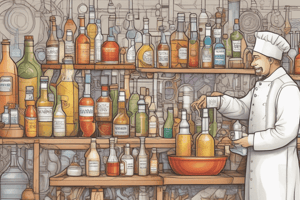Podcast
Questions and Answers
What drives companies to adopt more natural alternatives in food manufacturing processes?
What drives companies to adopt more natural alternatives in food manufacturing processes?
- Government regulations on synthetic compounds
- Consumer demand for transparent food production methods (correct)
- Lack of availability of synthetic preservatives
- Decreased cost of natural alternatives
Which factor does not influence the choice between synthetic and natural preservatives in food manufacturing?
Which factor does not influence the choice between synthetic and natural preservatives in food manufacturing?
- Color of the food product (correct)
- Consumer preference
- Cost
- Availability
What role do preservatives play in the food manufacturing process?
What role do preservatives play in the food manufacturing process?
- Enhancing the taste of food products
- Maintaining quality, safety, and shelf life of products (correct)
- Reducing consumer awareness
- Increasing the cost of production
How are preservatives regulated in the food industry to ensure consumer safety?
How are preservatives regulated in the food industry to ensure consumer safety?
What will food manufacturers need to continue doing to adapt to changing market demands?
What will food manufacturers need to continue doing to adapt to changing market demands?
Why do some consumers prefer natural alternatives over synthetic compounds in food products?
Why do some consumers prefer natural alternatives over synthetic compounds in food products?
What is the primary purpose of preservatives in food manufacturing processes?
What is the primary purpose of preservatives in food manufacturing processes?
How do preservatives help prolong the shelf life of various foods?
How do preservatives help prolong the shelf life of various foods?
Which type of preservative is commonly used in wine to prevent bacterial growth?
Which type of preservative is commonly used in wine to prevent bacterial growth?
Which preservative acts as an antioxidant to protect food from oxidation?
Which preservative acts as an antioxidant to protect food from oxidation?
What is a key role of regulatory bodies in relation to food additive preservatives?
What is a key role of regulatory bodies in relation to food additive preservatives?
Apart from preventing spoilage, what is another role of preservatives in food manufacturing processes?
Apart from preventing spoilage, what is another role of preservatives in food manufacturing processes?
Flashcards are hidden until you start studying
Study Notes
Food Manufacture Additive Preservatives: Ensuring Safe and Long-lasting Processes
In the world of food manufacturing, preservatives are essential in maintaining the quality and safety of various food products. These additives are used to prevent spoilage caused by microorganisms, such as bacteria, yeast, and molds, as well as chemical or physical factors like oxidation. Let's explore some aspects of food manufacturing processes that involve preservatives:
Microbial Preservation
Preservatives work by inhibiting the growth of bacteria and other microorganisms responsible for food spoilage. For instance, antimicrobial preservatives like sulphur compounds (E numbers E220-E228) are commonly used in wine to prevent bacterial growth. By preventing these organisms from multiplying, preservatives help prolong the shelf life of various foods.
Chemical Preservation
Besides controlling microbial growth, preservatives also protect against chemical reactions that can lead to spoilage. Sorbic acid (E200) is an example of a preservative used to prevent chemical spoilage in food products. By acting as an antioxidant, sorbic acid helps maintain the appearance and flavor of food items by protecting them from oxidation.
Regulation and Transparency
International and national regulatory bodies closely monitor the use of food additive preservatives to ensure their safety and effectiveness. Food manufacturers must comply with strict guidelines when using these additives. They are required to label products accordingly based on their category, such as preservative, color, or other specific functions. Consumer awareness and demand for transparent food production methods have led to increased scrutiny of food additive use, driving companies to adopt more natural alternatives whenever possible.
Choices in Preservatives
There are various types of preservatives used in food manufacturing processes, including synthetic compounds like benzoates and sorbates, as well as natural alternatives sourced from plants or microorganisms. While some consumers may prefer natural options, the choice between them depends on factors such as cost, availability, and compatibility with the specific food product being manufactured.
To summarize, preservatives play a crucial role in maintaining the quality, safety, and shelf life of food products during the manufacturing process. Their use is closely regulated by international and national authorities to ensure consumer safety. As technology advances and consumer preferences evolve, food manufacturers will continue to adapt their practices to accommodate both regulatory requirements and changing market demands.
Studying That Suits You
Use AI to generate personalized quizzes and flashcards to suit your learning preferences.




